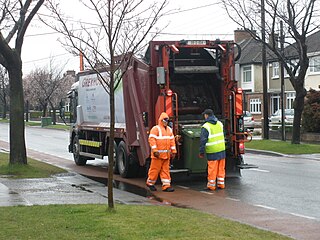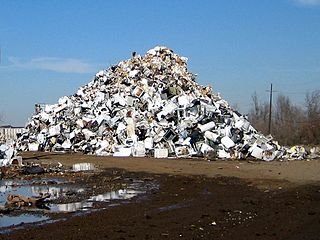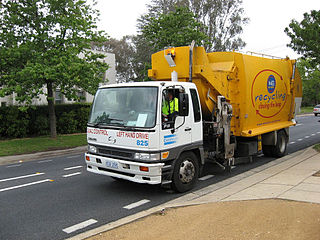
Recycling is the process of converting waste materials into new materials and objects. This concept often includes the recovery of energy from waste materials. The recyclability of a material depends on its ability to reacquire the properties it had in its original state. It is an alternative to "conventional" waste disposal that can save material and help lower greenhouse gas emissions. It can also prevent the waste of potentially useful materials and reduce the consumption of fresh raw materials, reducing energy use, air pollution and water pollution.

Waste management or waste disposal includes the processes and actions required to manage waste from its inception to its final disposal. This includes the collection, transport, treatment, and disposal of waste, together with monitoring and regulation of the waste management process and waste-related laws, technologies, and economic mechanisms.

A landfill is a site for the disposal of waste materials. It is the oldest and most common form of waste disposal, although the systematic burial of waste with daily, intermediate and final covers only began in the 1940s. In the past, waste was simply left in piles or thrown into pits.

Zero waste, or waste minimization, is a set of principles focused on waste prevention that encourages redesigning resource life cycles so that all products are repurposed and/or reused. The goal of the movement is to avoid sending trash to landfills, incinerators, oceans, or any other part of the environment. Currently 9% of global plastic is recycled. In a zero waste system, all materials are reused until the optimum level of consumption is reached.

A materials recovery facility, materials reclamation facility, materials recycling facility or multi re-use facility is a specialized waste sorting and recycling system that receives, separates and prepares recyclable materials for marketing to end-user manufacturers. Generally, the main recyclable materials include ferrous metal, non-ferrous metal, plastics, paper, glass. Organic food waste is used to assist anaerobic digestion or composting. Inorganic inert waste is used to make building materials. Non-recyclable high calorific value waste is used to making RDF and SRF

Glass recycling is the processing of waste glass into usable products. Glass that is crushed or imploded and ready to be remelted is called cullet. There are two types of cullet: internal and external. Internal cullet is composed of defective products detected and rejected by a quality control process during the industrial process of glass manufacturing, transition phases of product changes and production offcuts. External cullet is waste glass that has been collected or reprocessed with the purpose of recycling. External cullet is classified as waste. The word "cullet", when used in the context of end-of-waste, will always refer to external cullet.
A mechanical biological treatment (MBT) system is a type of waste processing facility that combines a sorting facility with a form of biological treatment such as composting or anaerobic digestion. MBT plants are designed to process mixed household waste as well as commercial and industrial wastes.

Waste diversion or landfill diversion is the process of diverting waste from landfills. The success of landfill diversion can be measured by comparison of the size of the landfill from one year to the next. If the landfill grows minimally or remains the same, then policies covering landfill diversion are successful. For example, currently in the United States there are 3000 landfills. A measure of the success of landfill diversion would be if that number remains the same or is reduced. In 2015 it was recorded that the national average of landfill diversion in the United States was 33.8%, while San Francisco had implemented the most effective policies and had recorded a landfill diversion rate of 77%.
There is no national law in the United States that mandates recycling. State and local governments often introduce their own recycling requirements. In 2014, the recycling/composting rate for municipal solid waste in the U.S. was 34.6%. A number of U.S. states, including California, Connecticut, Delaware, Hawaii, Iowa, Maine, Massachusetts, Michigan, New York, Oregon, and Vermont have passed laws that establish deposits or refund values on beverage containers while other jurisdictions rely on recycling goals or landfill bans of recyclable materials.

Veolia Environmental Services, formerly Onyx Environnement, is a division of Veolia Environnement. It employs nearly 78,000 staff, has operations in 35 countries around the world, and generated revenues of nearly €9.02 billion in 2009.

Rates of household recycling in Ireland have increased dramatically since the late 1990s. The Irish Environmental Protection Agency (EPA) is the agency with overall responsibility for environmental protection in Ireland and monitors rates of recycling in Ireland along with other measures of environmental conditions in Ireland. The EPA, along with Repak, the principal organisation for packaging recycling in Ireland, report on recycling rates each year. In 2012 Ireland’s municipal solid waste (MSW) recycling rate was 34%, while the rate of packaging recycling reached 79%. The amount of municipal waste generated per person per year in Ireland has fallen significantly in recent years. This figure remains above the European Union annual municipal waste average of 503 kg per person, however. Each local council in Ireland has considerable control over recycling, so recycling practices vary to some extent across the country. Most waste that is not recycled is disposed of in landfill sites.
Casella Waste Systems, Inc. is a waste management company based in Rutland, Vermont, United States. Founded in 1975 with a single truck, Casella is a regional, vertically integrated solid waste services company. Casella provides resource management expertise and services to residential, commercial, municipal and industrial customers, primarily in the areas of solid waste collection and disposal, transfer, recycling and organics services. The company provides integrated solid waste services in seven northeastern states: Vermont, New Hampshire, New York, Massachusetts, Connecticut, Maine and Pennsylvania, with its headquarters located in Rutland, Vermont. Casella manages solid waste operations on a geographic basis through two regional operating segments, the Eastern and Western regions, each of which provides a full range of solid waste services, and larger-scale recycling and commodity brokerage operations. Organics services, major account and industrial services, are also provided.

In 2015, 43.5% of the United Kingdom's municipal waste was recycled, composted or broken down by anaerobic digestion. The majority of recycling undertaken in the United Kingdom is done by statutory authorities, although commercial and industrial waste is chiefly processed by private companies. Local Authorities are responsible for the collection of municipal waste and operate contracts which are usually kerbside collection schemes. The Household Waste Recycling Act 2003 required local authorities in England to provide every household with a separate collection of at least two types of recyclable materials by 2010. Recycling policy is devolved to the administrations of Scotland, Northern Ireland and Wales who set their own targets, but all statistics are reported to Eurostat.

Demolition waste is waste debris from destruction of buildings, roads, bridges, or other structures. Debris varies in composition, but the major components, by weight, in the US include concrete, wood products, asphalt shingles, brick and clay tile, steel, and drywall. There is the potential to recycle many elements of demolition waste.

Clean Harbors, Inc. is an American provider of environmental and industrial services, including hazardous waste disposal for companies, small waste generators and federal, state, provincial and local governments.
The City of Oakland, California, adopted a Zero Waste Strategic Plan in 2006, detailing a road map for the city to follow toward the implementation of a Zero Waste System by 2020. As stated in a City Resolution, introduced by then Mayor Jerry Brown, Zero Waste principles:
Waste management in Russia refers to the legislation, actions and processes pertaining to the management of the various waste types encountered throughout the Russian Federation. The basis of legal governance for waste management in Russia at the federal level is outlined through Federal Law No. 89-FZ, which defines waste as “the remains of raw materials, materials, semi-finished products, other articles or products that have been formed in the process of production or consumption as well as the goods (products) that have lost their consumer properties”.

Appliance recycling is the process of dismantling scrapped home appliances to recover their parts or materials for reuse. Recycling appliances for their original or other purposes, involves disassembly, removal of hazardous components and destruction of the equipment to recover materials, generally by shredding, sorting and grading. The rate at which appliances are discarded has increased due in part to obsolescence due to technological advancement, and in part to not being designed to be repairable. The main types of appliances that are recycled are televisions, refrigerators, air conditioners, washing machines, and computers. When appliances are recycled, they can be looked upon as a valuable resources; if disposed of improperly, they can be environmentally harmful and poison ecosystems.

Recycling in Australia is a widespread, and comprehensive part of waste management in Australia, with 60% of all waste collected being recycled. Recycling is collected from households, commercial businesses, industries and construction. Despite its prominence, household recycling makes up only a small part (13%) of Australia's total recycling. It generally occurs through kerbside recycling collections such as the commingled recycling bin and food/garden organics recycling bin, drop-off and take-back programs, and various other schemes. Collection and management of household recycling typically falls to local councils, with private contractors collecting commercial, industrial and construction recycling. In addition to local council regulations, legislation and overarching policies are implemented and managed by the state and federal governments.

Waste management in Australia started to be implemented as a modern system by the second half of the 19th century, with its progresses driven by technological and sanitary advances. It is currently regulated at both federal and state level. The Commonwealth's Department of the Environment and Energy is responsible for the national legislative framework.














